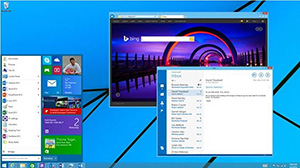News
Windows Start Menu Delayed?
Rumors are spreading that it may not appear until "Windows 9."
Microsoft won't bring back the Start Menu to its flagship Windows operating system until next year, according to a report.
The report, by veteran Microsoft watcher Mary Jo Foley, cites two of her unnamed sources as saying that the Start Menu won't appear in Windows 8.x until sometime in 2015. Microsoft may be delaying the release of that feature to coincide with its so-called "Threshold" OS release, Foley speculated. Threshold is a rumored code name for Microsoft's next-generation OS, possibly to be called "Windows 9," according to Foley.
The return of the Start Menu may not seem like a big deal, but it's been part of Microsoft's retrenched efforts to appease desktop PC users, who may have been put off by Windows 8's tablet-centric design, which heavily relies on a touch-based user interface. Microsoft showed off a mock-up of a planned new Start Menu during its Build developer event in early April. The mock-up shows a menu system running with multiple windows on the Desktop side of the OS (see figure). Shortly thereafter, Microsoft released Windows 8.1 Update, which added a Start Screen and various improvements for keyboard and mouse users, but no Start menu.
 [Click on image for larger view.]
Figure 1. Start Screen mock-up shown at Microsoft's Build developer event. Source:
April 2 Microsoft blog post.
[Click on image for larger view.]
Figure 1. Start Screen mock-up shown at Microsoft's Build developer event. Source:
April 2 Microsoft blog post.
Foley said that Microsoft originally had planned to release the new Start Menu with Windows 8.1 Update 2, which is expected in August of this year, according to her sources. Microsoft hasn't announced a forthcoming Windows 8.1 Update 2 so that's also still at the rumor stage.
The ability to run multiple Windows Store Apps ("Metro") program windows on the Desktop side of Windows 8.1 was another feature shown at Microsoft's Build event in April. That feature also will be delayed until the 2015 Threshold launch, according to Foley's sources.
Microsoft has said nothing about the release dates of its next-generation Windows or its next Windows update releases, so it's all still at the rumor stage now.
In general, Microsoft has been issuing its software updates on a more frequent basis. It's also been describing an evolving "universal apps" experience that will make it easier for developers to port their apps across Windows and Windows Phone OSes. According to Microsoft executives, those internal development efforts, which got rolling with the One Microsoft engineering team reorganization last year, are starting to gel. Microsoft is moving more toward a common OS release cycle for its various products, according to David Treadwell, corporate vice president of Microsoft's Operating Systems group.
"We had to finish Windows 8.1 Update, Windows Phone 8.1, Xbox One," Treadwell said, according to The Seattle Times. "Now that those are done, we are now on the same logistical schedules. We're going to have one common OS schedule and everything's going to be aligned with that. We're doing common planning now, common priority, common release schedules."
About the Author
Kurt Mackie is senior news producer for 1105 Media's Converge360 group.